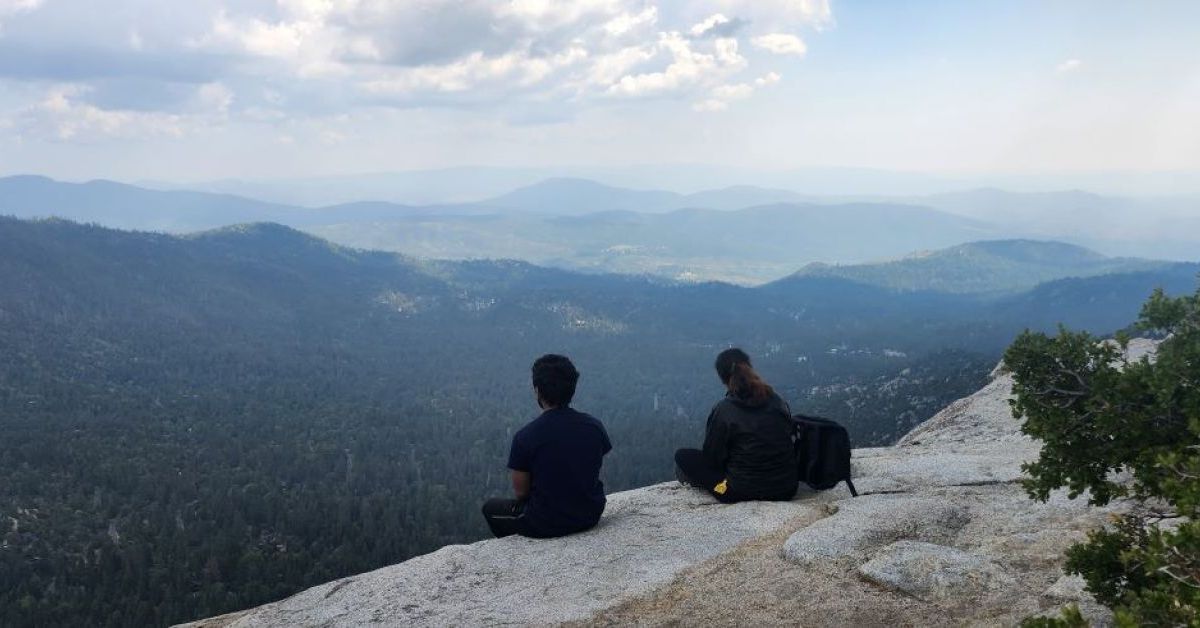Nature Heals
Exploring the Impact of the Environment on Mental Health
Published Date
Story by:
Media contact:
Topics covered:
Share This:
Article Content
In the depths of the desert and the magnitude of the mountains, a deafening silence rings—the type of silence that isn’t silent at all. No noise from civilization pervades the air. Only the chirps of birds, the burbling of a creek or the wind rustling through leaves undercut the quiet. Look up and a watercolor sunset awaits with beads of color running across the sky in bright rivulets.
This is the scene that greeted a small but tight-knit group of students who recently attended a Tritons Flourish Well-Being Camping Retreat near Mount Laguna. Co-organized by Counseling and Psychological Services (CAPS) and Outback Adventures (part of UC San Diego Recreation), the quarterly camping retreat is a three-day long program that brings students into the heart of Southern California’s native beauty to disconnect from from their daily routine, create long lasting connections and strengthen their bonds with the natural world.
“There’s something tremendously calming and therapeutic about forests and lakes, mountains and any natural space that’s really beautiful,” explained Simon Teale, the director of outdoor education for Outback Adventures. “It becomes this kind of magic space where you’re set away from the stresses of life and you can build confidence in one another and trust other people. That combination of being somewhere beautiful with people you trust is really huge.”
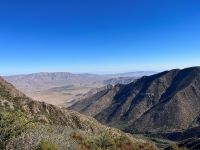
Teale originally proposed the idea of a wilderness camping trip focused on mental health and forming meaningful connections to CAPS in 2010. However, it wasn’t until the pandemic shifted all of CAPS and Outback’s programming online that the proposal gained traction. A fateful conversation with Vice Chancellor for Student Affairs Alysson M. Satterlund helped secure funding for the partnership.
Into the Wild
Beginning with a backpacking trip to Joshua Tree in February 2022, CAPS and Outback Adventures have run one overnight trip every quarter. During the trips, Outback student staff leaders and CAPS staff partner to provide a variety of mental health and wilderness skill-building activities.
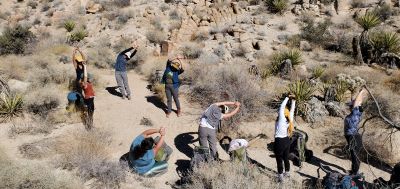
“CAPS offers a variety of services aimed at boosting students’ mental health, with some of the most sought after being those that students seek for managing stress, anxiety and building social connection,” said Bryan Balvaneda, one of the staff psychologists at CAPS who helped develop the programming used on many of the camping trips. “We'd been chatting with Outback for years about offering these services in the wilderness so students can experience the healing effect of nature on mental health and can experience teamwork, teambuilding and learn positive psychology methods while surrounded by the wilderness.”
Katie Dilworth, a second-year student double-majoring literature/writing and world literature and culture, was originally on the waitlist for the most recent camping trip near Mount Laguna. When a spot opened up the day before the trip, she wasn’t sure if she wanted to attend at the last minute. “My mum encouraged me to go out there and do it and try something out of my comfort zone—I love nature, but I’m usually not a big hiker.”
During the second day of the trip after a morning yoga session, the students went on a 4-mile hike to the top of a mountain; though it was steep and challenging at times, the hike’s difficulty was moderated by various mindfulness exercises and community-building activities. One exercise that was particularly impactful for Tony Meng, a fourth-year student studying cognitive science, was the opportunity to simply slow down and take a breath. Most students on the trip didn’t bring their phone or watch; by the end, breaking free from digital devices and experiencing life without the perception of time helped him feel closer to the world and enabled him to live in the moment.
“We got to experience the world without any distractions. It was just the treetops above us and birds flying around us. Without any distracting noise, we got to see the world just as it was.”
Like Dilworth, Meng also joined the trip because he wanted to push himself out of his comfort zone and break through his every day routine. Still, the combination of mental health practices with natural environments was what inspired him to take the final leap. Meng added that, despite the trip only lasting three days, the length of time felt amplified.
“We built a close connection between all of us and the environment around us. It was really impactful being inspired to develop our goals and values at the beginning of the trip and then put what we learned into action and see it all play out in vivo.”
Building a Partnership Between CAPS and Outback Adventures
That type of connection is exactly what Tiffany O’Meara, the director of outreach services at CAPS, had hoped would arise from the partnership with Outback Adventures. She explained that, while CAPS and Outback Adventures both have expertise in certain areas of well-being, their partnership allows them to create so much more than just the sum of their parts.
The partnership extends beyond just the well-being camping trip. The Tritons Flourish initiative is a collaborative partnership between departments dedicated to providing engaging and inspiring programming focused on student well-being, including Counseling and Psychological Services (CAPS), Health Promotion Services (HPS), Recreation, and Student Affairs Case Management Services (SACM).
Through the Tritons Flourish Initiative, CAPS works with Recreation to present the Tritons RISE Together workshop series that hosts skills-based workshops based on peak performance psychology, mind-body sciences and positive psychology. Every week, RISE offers a variety of workshops including “SunRISE Yoga Sessions” that center a yoga class around a growth mindset and intention setting.
“With our SunRISE yoga sessions, CAPS brings the content: gratitude practices, growth mindsets, mindfulness and more,” O’Meara remarked, noting that a trauma-informed yoga therapist and psychologist attend every yoga session. “By sharing it in the context of recreation (e.g. in a yoga class), students get the best of both worlds by attending one workshop. Our partnership is strength-based programming that provides our students with strategies to not only persevere, but to flourish.”
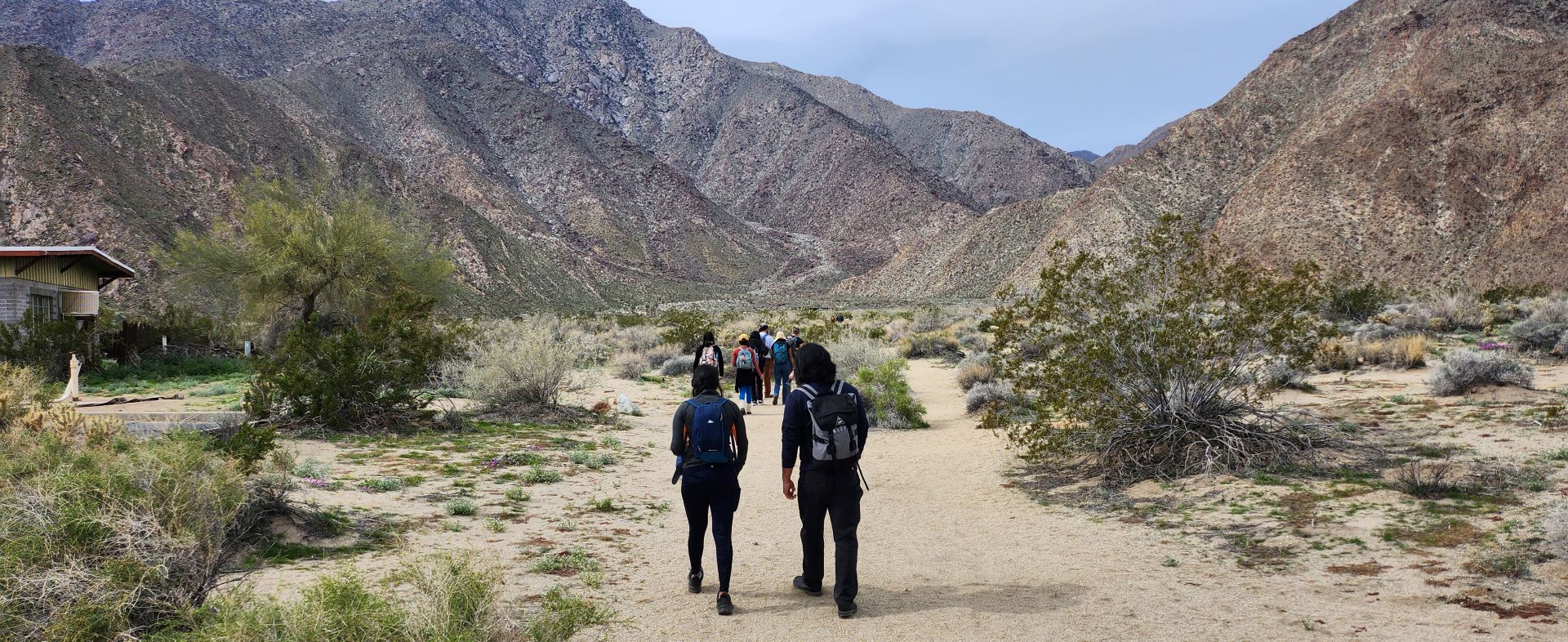
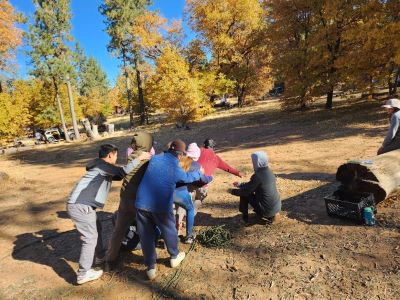
RISE was also recently recognized by NIRSA: Leaders in Collegiate Recreation as a “Promising Practice” for universities around the nation. The program strives to increase overall student well-being and personal development.
“We developed the partnership with Outback around a 'challenge by choice' mantra; being able to challenge ourselves and grow from it is key to well-being,” Balvaneda added. He mentioned how being in nature can create a sense of awe; the partnership aims to link that sense of awe to positive mental health practices.
“The beauty of it is that we tap into different parts of well-being: building resilience and adaptability through rock-climbing, developing grit and shifting our mindset to see challenges as an opportunity for growth, holding self-compassion to be kind to ourselves while recognizing our setbacks, improving our mindfulness during hiking and so much more.”
Both Dilworth and Meng shared a trust exercise that was pivotal for their experience on the camping trip and how they thought about well-being. Each participant wrote a goal on an index card and set it down about six feet away from a circle of rope where they stood in a group. Once everyone was inside the circle, the aim of the exercise became clear: reach your goals without touching the ground or stepping outside of the circle.
“We all thought it was impossible at first because our cards were too far away,” Dilworth said. “By the end, we figured out that we all had to work together to grab the cards. There was a lot of maneuvering around and communication required, but also a lot of silliness and laughter as we all united around the same goal. We really had to trust the others not to drop us!”
Meng echoed her sentiment, noting that you need everyone in your circle to help out with reaching your goals.
Want to Take the Leap?
For students considering joining a future well-being camping trip, Dilworth and Meng had one outstanding recommendation: follow the packing list. Both admitted that they’d seen the packing list as recommended, but not fully necessary. As there can be much colder temperatures in the desert during the night compared to the coast, bringing warm clothes is essential.
More important than what you pack, however, is whether you go at all. For Dilworth and Meng, the opportunity to swap Muir for mountains and Geisel for green pastures and to focus on their mental well-being was one they couldn’t speak more highly of.
“It was one of the most immersive experiences I’ve ever had, and I got more out of it than I expected,” Meng said. “If you’re on the fence, just go for it: it’s something new in a totally different environment. This is a great opportunity to grow out of your comfort zone, learn more about yourself and build your connection with nature.”
“The beauty of it is that we tap into different parts of well-being: building resilience and adaptability through rock-climbing, developing grit and shifting our mindset to see challenges as an opportunity for growth, holding self-compassion to be kind to ourselves while recognizing our setbacks, improving our mindfulness during hiking and so much more.”
Stay in the Know
Keep up with all the latest from UC San Diego. Subscribe to the newsletter today.
